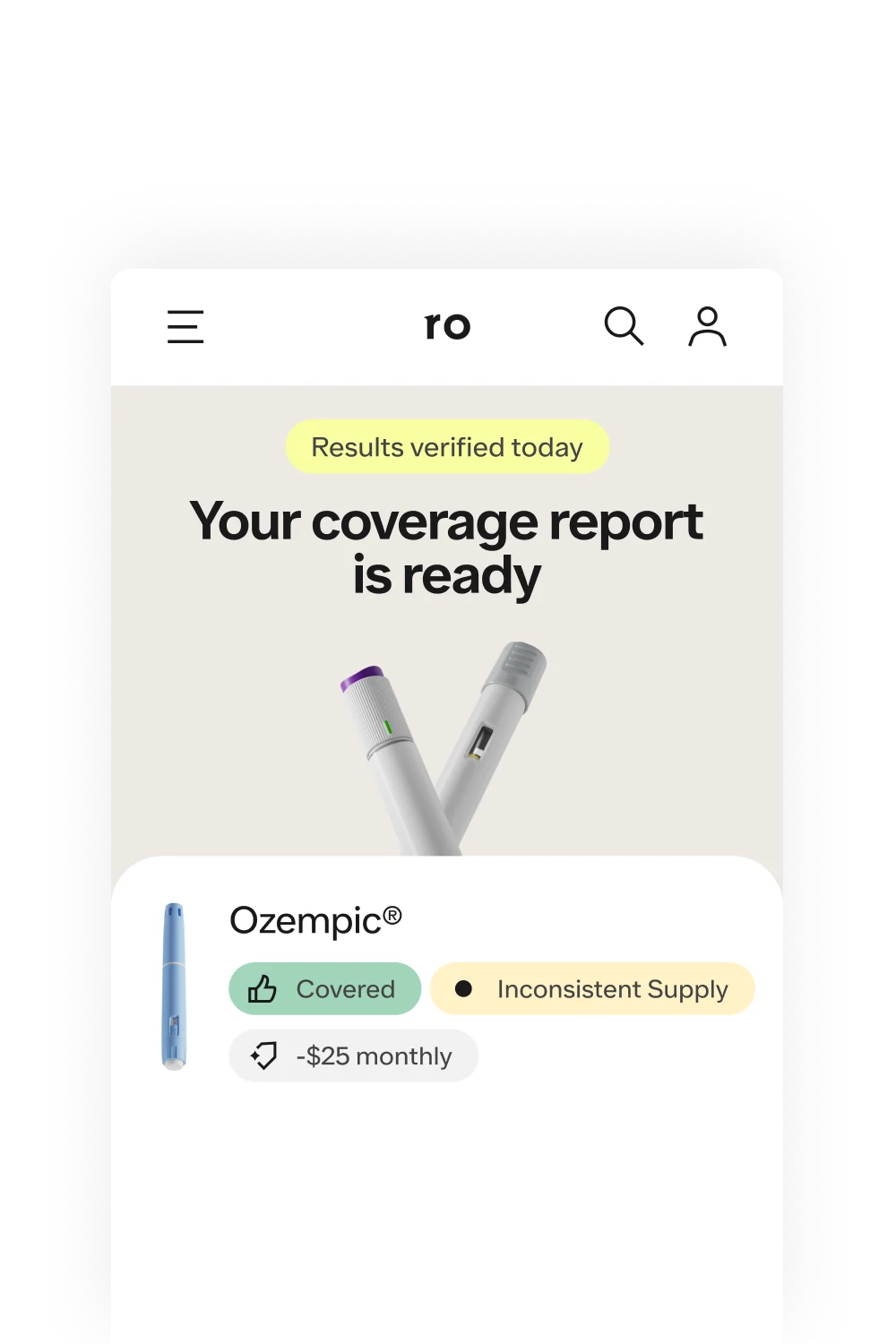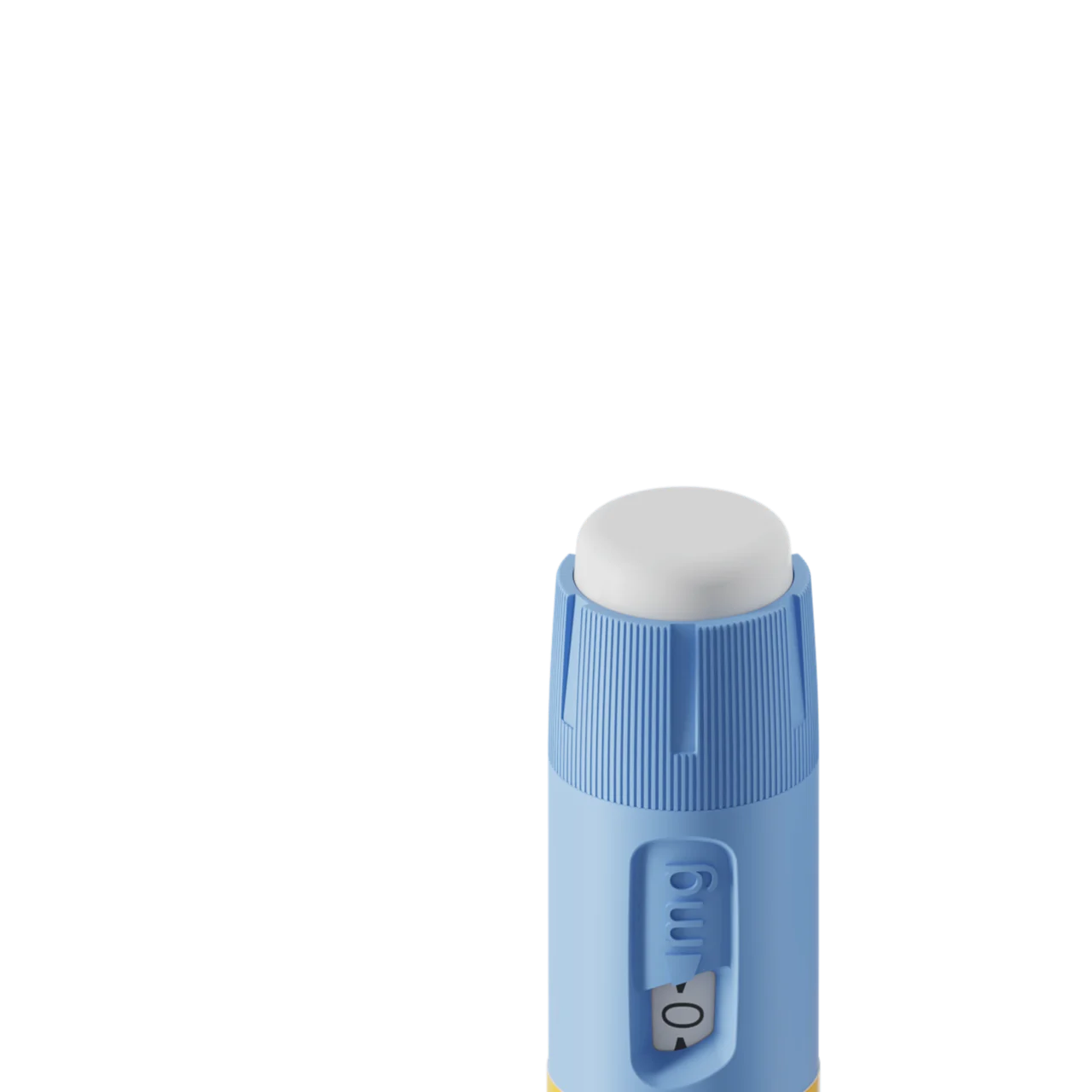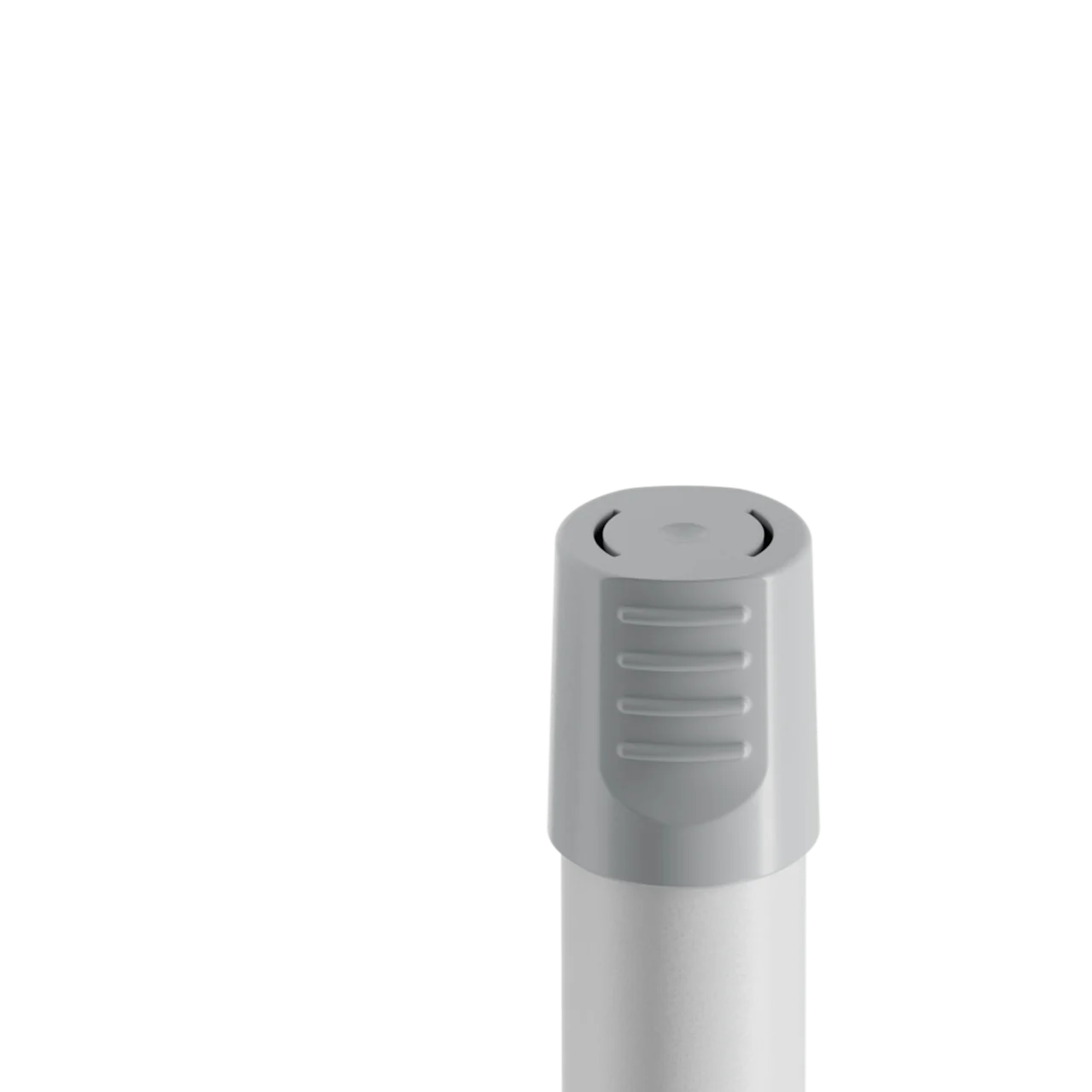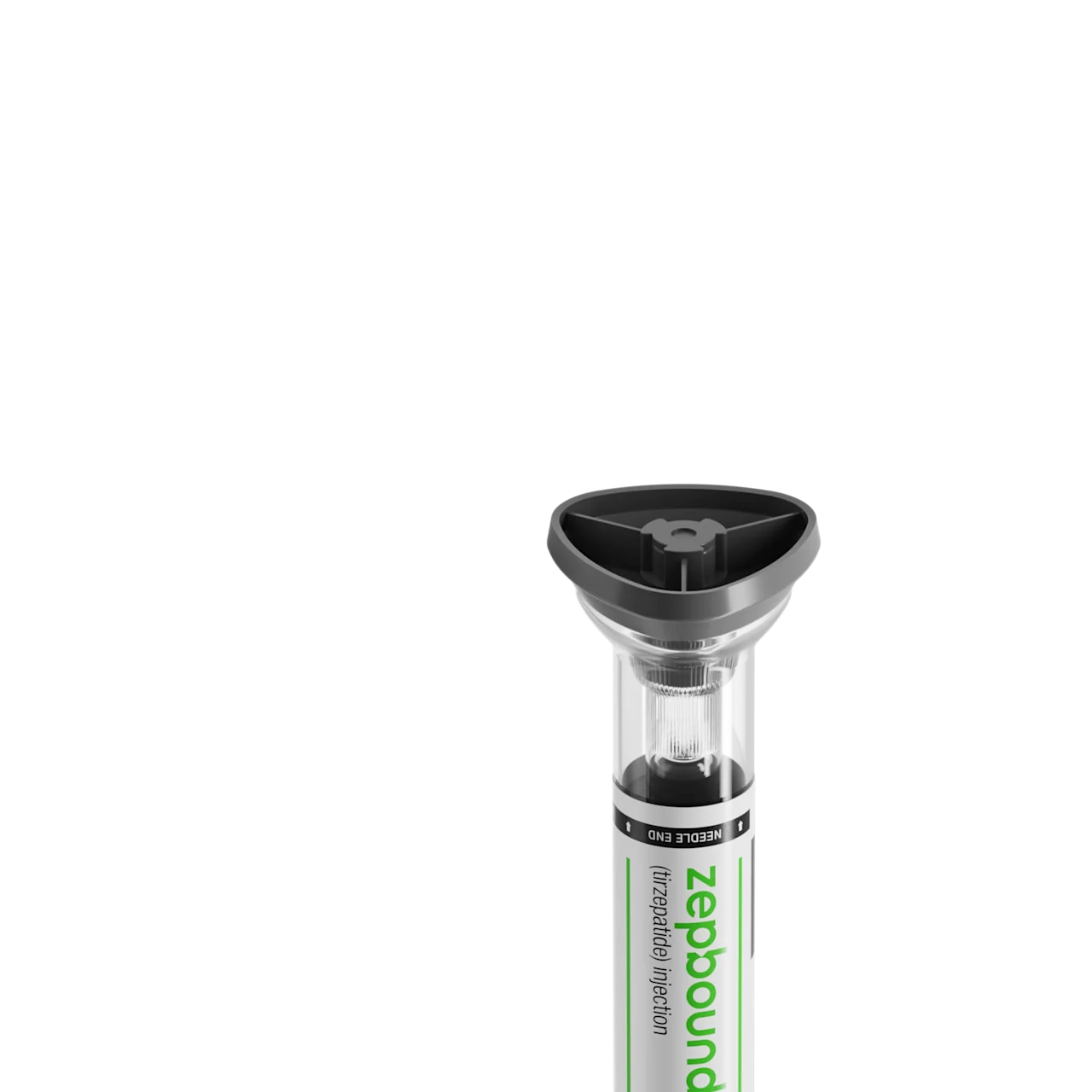Key takeaways
Most people take Wegovy for at least three months to assess its effectiveness, with longer-term use recommended for sustained weight loss and heart health benefits.
Typically, people notice weight loss within the first 1–3 months of taking Wegovy, along with reduced appetite and food cravings.
Research shows that stopping Wegovy may lead to significant weight regain and a loss of cardiovascular benefits.
Here's what we'll cover
Key takeaways
Most people take Wegovy for at least three months to assess its effectiveness, with longer-term use recommended for sustained weight loss and heart health benefits.
Typically, people notice weight loss within the first 1–3 months of taking Wegovy, along with reduced appetite and food cravings.
Research shows that stopping Wegovy may lead to significant weight regain and a loss of cardiovascular benefits.
So, you’re interested in taking a glucagon-like peptide-1 (GLP-1) medication like Wegovy (semaglutide) for weight loss. But before you make a decision (with your healthcare provider, of course), you first want to get answers to some of your most pressing questions, such as “how long do you take Wegovy for weight loss?” and “how long does it take Wegovy to work?”
Here’s the thing, though: There’s no one set timeline for everyone.
Read on as we break down what experts and research say about how long you have to take Wegovy for weight loss, explore the pros and cons of staying on the medication long-term, and more.
How long do you have to take Wegovy for weight loss?
The answer to this question varies from person to person, but Wegovy is usually intended for long-term use, says Supriya Rao, MD, DABOM, a quadruple board-certified physician specializing in obesity medicine and lifestyle medicine. That’s because, in addition to weight loss, it helps maintain weight by regulating your appetite and metabolism, Dr. Rao says.
A study lasting 68 weeks (about a year and a half) found that people taking Wegovy lose about 15% of their body weight in that time period, compared with only 2.4% for those taking a placebo. However, you likely won’t have to wait that long to see results. The aforementioned study found that Wegovy led to an average:
2% weight loss in the first month
4% weight loss in the first 2 months
6% weight loss in the first 3 months
There are a few factors that can affect how quickly you lose weight on Wegovy. “Medications like Wegovy work best alongside lifestyle changes, such as diet and exercise,” Dr. Rao says. In addition to diet and exercise, the dosage prescribed and other health conditions you may have can also affect how quickly you lose weight on Wegovy.
For example, another study found that people taking Wegovy lost just under 6% of their starting weight at three months and just under 11% at six months. But that same study noted that people with type 2 diabetes lost less weight than those without diabetes: about 2% less at three months and 5% less at six months. And those taking the highest dosage strength of 2.4 mg lost more weight than those taking the 1.7 mg dose. This suggests the weight loss results you experience on Wegovy may be dose-dependent.
How long does it take for Wegovy to work?
“Most people start noticing weight loss within the first four weeks of taking Wegovy,” Dr. Rao says. “More noticeable results are usually seen within a few months, especially once the full maintenance dose is reached, about 16-20 weeks.”
Registered dietitian Gabby Zeagler, MS, RD, CDN, CDCES, says she’s seen Wegovy start to affect clients within a week. “Some people say they feel it immediately after injecting, but to truly notice the appetite-lowering effects and the accompanying weight loss, it typically takes a few weeks. However, there are always a few clients who are non-responders and report feeling no effects at all.”
With Wegovy, most people lost at least 5% of their body weight by the 20-week mark. But about 15% of people lose less than that. Research shows that many of these non-responders can still achieve significant weight loss with Wegovy; they just lose less than so-called “responders” do. For example, after 68 weeks (about a year and a half), responders lost 19.7% of their body weight, compared with 6.4% for non-responders
How long does it take to reach the right Wegovy dosage?
The “right” Wegovy dosage differs from person to person, depending on their response to the medication and tolerance for common side effects, which can include nausea, diarrhea, vomiting, headache, and fatigue. There are two “maintenance” dosages of Wegovy: 1.7 mg and 2.4 mg. Before you reach those, however, you’ll likely spend at least a few weeks or months at the lower doses, which include 0.25 mg, 0.5 mg, and 1 mg.
It’s recommended that people start Wegovy at 0.25 mg weekly. This starting dose helps your body get used to the medication and its side effects. Then, your healthcare provider will gradually increase your dosage—usually every four weeks, but it may be faster or slower depending on your response—until you reach the maximum dosage of Wegovy that is right for you. “The dosage is steadily increased to minimize side effects,” Dr. Rao says.
The 2.4 mg dosage of Wegovy has been shown to deliver the greatest weight loss, but it’s not right for everyone. Some people may tolerate the side effects of Wegovy better at the 1.7 mg dosage, and that will be the right dosage for them. Both 1.7 mg and 2.4 mg are effective maintenance doses of Wegovy.
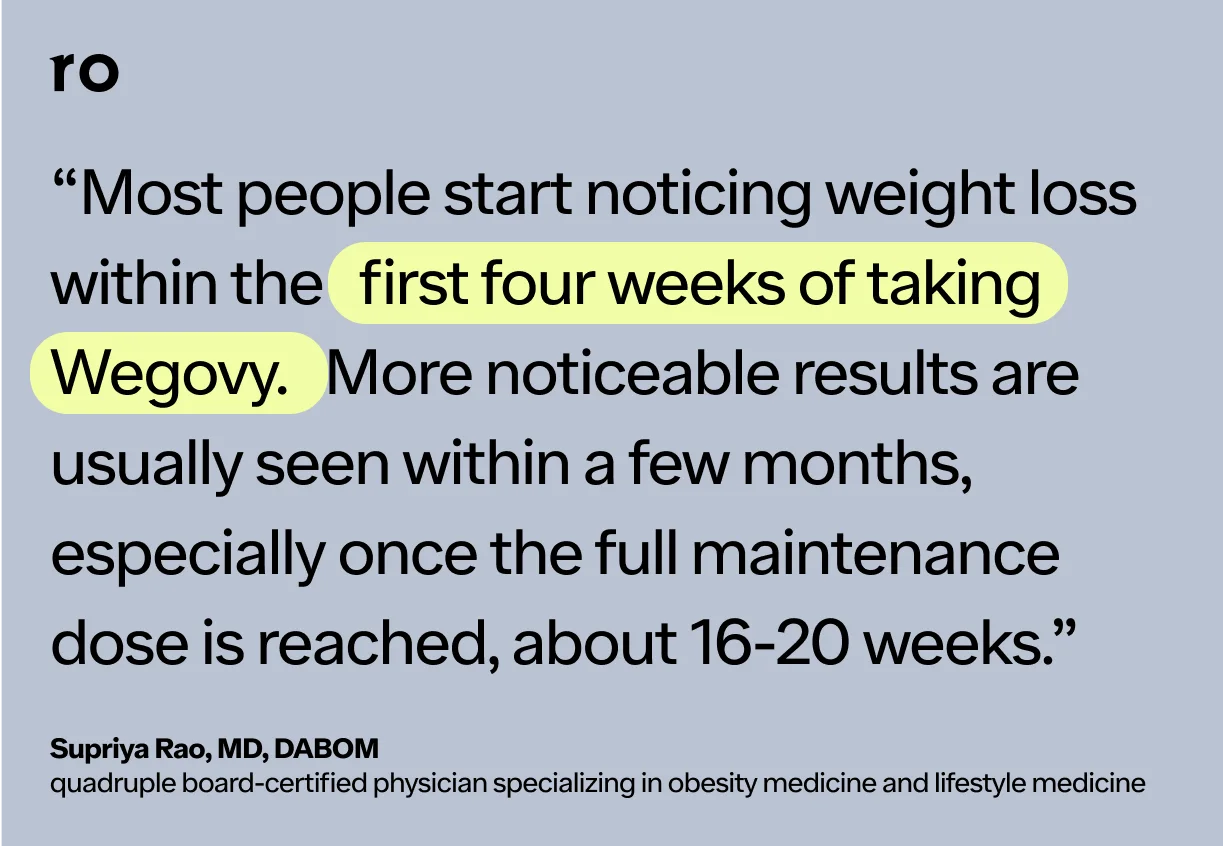
Pros of staying on Wegovy long term
Wegovy is intended for long-term use, not only so that you can lose weight but so you can keep off the weight you lost, too. “Most folks think of weight maintenance as a benefit, but the medication can also improve health markers like blood sugar and cholesterol and reduce the risk of obesity-related conditions,” Dr. Rao says.
Beyond weight loss, there are other benefits to staying on Wegovy long-term, says Emily Villaseca, RD, owner and lead dietitian at Pass the Chia. “[People experience] decreased ‘food noise,’ better control of appetite, and improvements in insulin sensitivity and blood sugar.”
Clinical trials have found that when people stop taking Wegovy, they can regain as much as two-thirds of the weight lost in one year. And the other health improvements they experienced on Wegovy can backslide and even return to baseline levels, potentially leading to high blood pressure, high cholesterol, and elevated blood sugar levels.
On the other hand, when people continue taking Wegovy, they tend to maintain the weight loss and experience fewer adverse health outcomes than those taking a placebo—including a 20% lower risk of experiencing a serious cardiovascular event, such as heart attack, stroke, or death. One study found that weight loss tends to plateau after about one year, but the drug sustains weight loss for at least four years. To maintain weight loss on Wegovy, it’s important to keep up with the diet, exercise, and other healthy lifestyle changes you’ve made during your Wegovy treatment.
Cons of staying on Wegovy long term
The main cons of staying on Wegovy in the long term are related to its side effects and high cost, Dr. Rao says.
When you start taking Wegovy, the drug’s gastrointestinal side effects—including nausea, vomiting, diarrhea, and constipation—can be frequent and intense. Making changes to what you eat and how you eat can make a big difference, such as eating smaller portions to reduce nausea and drinking plenty of water to relieve constipation. For some people, increasing their fiber intake, either naturally through their diet or with a supplement, can also help with constipation. Speak to your healthcare provider if you are experiencing side effects. In some cases, medications can be prescribed to help address the side effects and enable you to continue medication if that is your goal.
“One potential concern is bone health, given the rapid weight loss caused by these medications,” Zeagler says. “Without proper exercise, particularly resistance training, individuals may experience a decline in bone density due to the loss of fat mass and changes in adipokines like leptin and adiponectin.” These effects can be combated through strength training, adequate calcium and vitamin D, and appropriate protein intake. However, an analysis of adults who took Wegovy for cardiovascular disease did not find a significantly increased risk of fractures in people on the medication.
Villaseca also recommends strength training along with cardio exercises to build muscle, boost heart health, and maximize weight loss on Wegovy. “Muscles use more energy, so they increase your metabolism and fat-burning ability,” she says, adding, “You can start with bodyweight exercises at home.”
When is the best time to stop Wegovy?
The “best” time to stop Wegovy depends on the person taking the medication and their specific situation. There are a number of reasons why you might need to stop Wegovy. Some people cannot tolerate the side effects and need to switch to another weight loss medication. Others may start trying to conceive or become pregnant. (Ideally, Wegovy should be stopped at least two months before a planned pregnancy due to the drug’s long half-life.)
One of the common reasons people stop Wegovyis due to a lack of insurance coverage and the drug’s high out-of-pocket cost, according to Zeagler. “Stopping Wegovy or similar medications cold turkey, often due to insurance reasons, has not led to the best outcomes in my experience,” she says. “When clients abruptly discontinue the medication, their cravings tend to return twice as strong, often leading to rapid weight regain at an exponential rate.”
“People may stop taking Wegovy due to side effects, cost, or if they’ve achieved their weight loss goals and can maintain them through lifestyle changes,” Dr. Rao says. “You and your healthcare provider should agree that it’s safe and sustainable to stop, and you should have a solid plan to maintain your progress without the medication.”
Ideally, staying on the medication is recommended for weight loss maintenance since research has shown that stopping it can result in weight regain, just like what you might expect if a person stops a particular diet plan or exercise regimen.
Rx weight loss with Ro
Get access to prescription weight loss medication online
Bottom line
How long you take Wegovy depends on your weight loss goals, response to the medication, and tolerance for side effects. While many people see results within the first few months, long-term use may be necessary to sustain weight loss and improve overall health.
You should see results within three months. If Wegovy is effective, most people lose at least 5% of their body weight by the 20-week mark. If no weight loss occurs in three months, your doctor may discontinue treatment.
Dosage adjustments take time. It can take several months to reach the right dosage of Wegovy. Usually, maintenance doses are 1.7 mg or 2.4 mg, depending on what you can tolerate. Side effects like nausea and constipation may influence your ability to stay on the higher dose.
Stopping Wegovy may lead to weight regain. Studies show that people who discontinue Wegovy tend to regain about two-thirds of the weight lost within a year. Gradual tapering and lifestyle changes can help mitigate this.
Long-term use of Wegovy has its pros and cons. While continued use helps maintain weight loss and reduce cardiovascular risks, potential side effects—including gastrointestinal distress—can be a downside.
Frequently asked questions (FAQs)
How long can you use Wegovy for weight loss?
How long you use Wegovy on your weight loss journey depends on your response to the medication and tolerance for side effects. If you respond well to the medication and can manage the side effects, your healthcare professional may recommend taking it long-term to lose weight, maintain weight loss, or reduce your cardiovascular risk.
What happens when you quit taking Wegovy?
Research suggests people who stop taking Wegovy regain about two-thirds of the weight they lost after one year. Other cardiovascular benefits you may have experienced while taking the drug, such as improved cholesterol, blood pressure, and blood sugar levels, may also regress and, in some cases, may return to baseline levels.
Is Wegovy a lifetime medication?
Even after initial weight loss, research shows that Wegovy continues to support chronic weight management and help you keep off the weight you lost, especially if you continue with diet and exercise changes. For that reason, some people may continue taking Wegovy long-term, as shown in many Wegovy reviews. Some people may also take Wegovy for other conditions that require chronic treatment, such as cardiovascular disease.
DISCLAIMER
If you have any medical questions or concerns, please talk to your healthcare provider. The articles on Health Guide are underpinned by peer-reviewed research and information drawn from medical societies and governmental agencies. However, they are not a substitute for professional medical advice, diagnosis, or treatment.
GLP-1 Important Safety Information: Read more about serious warnings and safety info.
Wegovy Important Safety Information: Read more about serious warnings and safety info.
References
Ghusn, W., De La Rosa, A., Sacoto, D., et al. (2022). Weight loss outcomes associated with semaglutide treatment for patients with overweight or obesity. JAMA Network Open, 5(9), e2231982. doi: 10.1001/jamanetworkopen.2022.31982. Retrieved from https://jamanetwork.com/journals/jamanetworkopen/fullarticle/2796491
Gorgojo-Martínez, J. J., Mezquita-Raya, P., Carretero-Gómez, J., et al. (2022). Clinical Recommendations to Manage Gastrointestinal Adverse Events in Patients Treated with Glp-1 Receptor Agonists: A Multidisciplinary Expert Consensus. Journal of Clinical Medicine, 12(1), 145. doi: 10.3390/jcm12010145. Retrieved from https://pmc.ncbi.nlm.nih.gov/articles/PMC9821052/
Kushner, R. F., Ryan, D. H., Deanfield, J., et al. (2025). Safety profile of semaglutide versus placebo in the SELECT study: a randomized controlled trial. Obesity (Silver Spring, Md.), 33(3), 452–462. doi: 10.1002/oby.24222. Retrieved from https://onlinelibrary.wiley.com/doi/10.1002/oby.24222
Mosenzon, O., Garvey, W. T., Hesse, D., et al. (2021). Clinically-Relevant Weight Loss is Achieved Independently of Early Weight Loss Response to Once-Weekly Subcutaneous Semaglutide 2.4 MG (STEP 4). Journal of the Endocrine Society, 5(Suppl 1), A7. doi: 10.1210/jendso/bvab048.013. Retrieved from https://pmc.ncbi.nlm.nih.gov/articles/PMC8265765/
Rubino, D., Abrahamsson, N., Davies, M., et al. (2021). Effect of Continued Weekly Subcutaneous Semaglutide vs Placebo on Weight Loss Maintenance in Adults With Overweight or Obesity: The STEP 4 Randomized Clinical Trial. JAMA, 325(14), 1414–1425. doi: 10.1001/jama.2021.3224. Retrieved from https://jamanetwork.com/journals/jama/fullarticle/2777886
Ryan, D. H., Lingvay, I., Deanfield, J., et al. (2024). Long-term weight loss effects of semaglutide in obesity without diabetes in the SELECT trial. Nature Medicine, 30(7), 2049–2057. doi: 10.1038/s41591-024-02996-7. Retrieved from https://www.nature.com/articles/s41591-024-02996-7
U.S. Food and Drug Administration (FDA). (2024). Wegovy (semaglutide) injection, for subcutaneous use. Retrieved from https://www.accessdata.fda.gov/drugsatfda_docs/label/2024/215256s015lbl.pdf
Wilding, J. P. H., Batterham, R. L., Calanna, S., et al. (2021). Once-Weekly Semaglutide in Adults with Overweight or Obesity. New England Journal of Medicine, 384(11), 989–1002. doi: 10.1056/nejmoa2032183. Retrieved from https://www.nejm.org/doi/full/10.1056/NEJMoa2032183
Wilding, J. P. H., Batterham, R. L., Davies, M., et al. (2022). Weight regain and cardiometabolic effects after withdrawal of semaglutide: The STEP 1 trial extension. Diabetes, Obesity & Metabolism, 24(8), 1553–1564. doi: 10.1111/dom.14725. Retrieved from https://pmc.ncbi.nlm.nih.gov/articles/PMC9542252/



